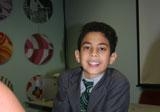What shortage of scientists?
Australia's well-documented shortage of scientists is being tackled head on by UNSW research.
Australia's well-documented shortage of scientists is being tackled head on by UNSW research.

Australia's well-documented shortage of scientists is being tackled head on by UNSW research.
Gifted children, who are around 12 years of age, from six Sydney schools have taken part in a year-long study conducted by UNSW's Gifted Education Research Resource and Information Centre (GERRIC).
The study involved a series of workshops where the students met with people from different professions, who use science in their everyday lives. They covered a variety of topics including environmental sustainability and bioluminescence.
"The aim is to change students' and teachers' views about science," said Professor Karen Rogers, Director of Research at GERRIC.
"This is a crucial age because it is when they decide if they want to be achievers, or slide. It's also when girls in particular move away from science," she said.
The group have had their final excursion to the Powerhouse Museum.
The focus in the final session was on electromagnetism - invisible and visible energy waves across the electromagnetic spectrum.
The students were able to make an antenna and get reception from a television and record sound waves through antennas.
"Schools often teach from a text or a set of materials, which are dry and often based on memory. The students don't see it as challenging," said Professor Rogers. "This program challenges their perceptions of what science is."